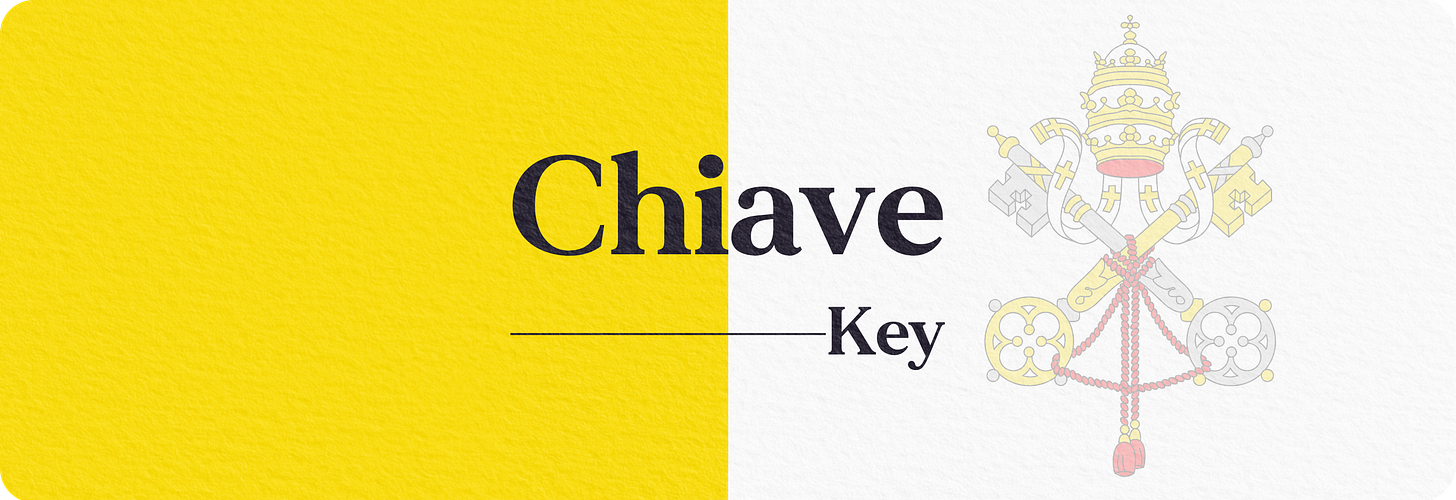Chiave (transl. Key)
[AUDIO + QUIZ] 🗝️ Practicing Italian is key to learning it, so here's a test on some special keys.
🎙️ COME SI PRONUNCIA?
[KYAH-veh]
SOSTANTIVO FEMMINILE
FEMININE NOUN
Key.
🇮🇹 Strumento metallico usato per aprire e chiudere serrature.
🇬🇧 A metal instrument used to open and close locks.
Solution, Answer.
🇮🇹 Elemento decisivo per risolvere un problema o comprendere una situazione.
🇬🇧 A decisive element for solving a problem or understanding a situation.
💬 ESEMPI
Ho perso le chiavi di casa e non posso entrare.
I lost my house keys and can't get in.
La chiave per imparare una nuova lingua è la pratica costante.
The key to learning a new language is constant practice.
📚 ESPRESSIONI UTILI
A chiave
→ Locked
Ho chiuso la porta a chiave prima di uscire.
I locked the door before leaving.
Girare la chiave
→ To turn the key (literal), to start something (figurative)
È il momento di girare la chiave e iniziare questa nuova avventura.
It's time to turn the key and start this new adventure.
Buttare la chiave
→ To throw away the key (figurative: to lock someone up and never let them out)
Per quel crimine, molti pensano che dovrebbero buttare la chiave.
For that crime, many think they should throw away the key.
Chiave di lettura
→ Interpretation key
Questa informazione offre una nuova chiave di lettura per capire il romanzo.
This information offers a new interpretation key to understand the novel.
In chiave
→ In terms of, in the style of
Il film reinterpreta la storia classica in chiave moderna.
The film reinterprets the classic story in a modern style.
Essere la chiave di tutto
→ To be the key to everything
La fiducia reciproca è la chiave di tutto in una relazione.
Mutual trust is the key to everything in a relationship.
Parola chiave
→ Keyword
Usa la parola chiave corretta per trovare l'informazione nel database.
Use the correct keyword to find the information in the database.
Posizione chiave
→ Key position
Occupa una posizione chiave nell'azienda e le sue decisioni sono molto influenti.
He occupies a key position in the company and his decisions are very influential.
Momento chiave
→ Key moment, crucial moment
Il gol segnato all'ultimo minuto è stato il momento chiave della partita.
The goal scored in the last minute was the key moment of the match.
Passaggio chiave
→ Key passage, crucial point
Questo passaggio chiave del libro rivela le vere intenzioni del protagonista.
This key passage of the book reveals the true intentions of the protagonist.
Chiave di volta
→ Keystone, crucial element
La collaborazione è la chiave di volta del successo del progetto.
Collaboration is the keystone of the project's success.
🔎 L’ORIGINE DELLA PAROLA
🇮🇹 Chiave viene dal latino clavis, che vuol dire "chiave". Clavis viene dal greco kleis (κλείς), con lo stesso significato.
La radice proto-indoeuropea è *kleh₂u-, che significava "uncino" o "chiodo ricurvo", ed è alla base di molte parole in diverse lingue, tutte legate al concetto di "chiudere" o "bloccare":
Inglese: key (chiave), ma anche claw (artiglio)
Tedesco: Schlüssel (chiave)
Russo: ключ (klyuch, chiave)
L'evoluzione di significato da "uncino" a "chiave" evidenzia lo sviluppo tecnologico dei meccanismi di chiusura: i primi lucchetti utilizzavano probabilmente semplici ganci o uncini per bloccare, che poi si sono evoluti in meccanismi più complessi.
🇬🇧 Chiave comes from the Latin clavis, which means "key". Clavis comes from the Greek kleis (κλείς), with the same meaning. The Proto-Indo-European root is *kleh₂u-, which meant "hook" or "curved nail", and is the basis for many words in different languages, all related to the concept of "closing" or "locking":
English: key, but also claw
German: Schlüssel (key)
Russian: ключ (klyuch, key)
The evolution of meaning from "hook" to "key" highlights the technological development of locking mechanisms: the first locks probably used simple hooks or pins to block, which then evolved into more complex mechanisms.
🏋️ ALLENATI CON IL QUIZ!
READ & TEST YOUR COMPREHENSION
Visto che la parola di oggi è chiave, ho pensato di parlare di uno Stato le cui chiavi sono famose in tutto il mondo.
Ho chiesto a un’amica e collega dentro Treccani, Sofia, di spiegare l’origine della bandiera vaticana. Abbiamo preparato tre versioni:
solo audio - senza sottotitoli
con sottotitoli in italiano
con sottotitoli in inglese
Scegli tu quale ascoltare e ricordati di fare il quiz subito dopo!
Since today's word is chiave (key), I thought of talking about a State whose keys are very well-known all over the world. I asked a friend and colleague at Treccani, Sofia, to explain the origin of the Vatican flag. We have prepared three versions:
audio only - without subtitles
with Italian subtitles
with English subtitles
You choose which one to listen to and remember to take the quiz right after!
👉 YOUR TURN
Can you use the word CHIAVE correctly in a sentence?
Based on the definition and examples provided, write a sentence using today's word of the day and share it as a comment on this post. It is important that your sentence makes sense and shows that you understand the word's definition, but we also encourage you to use creativity and have fun.




Ho trovato le chiavi sul tapetino dopo averle cercate per ore e ore. La chiave per non perdere nulla è lasciare tutto al suo posto, ma questa è la cosa più difficile.
Un bel aiuto per migliorare la comprensione della parola parlata, grazie.